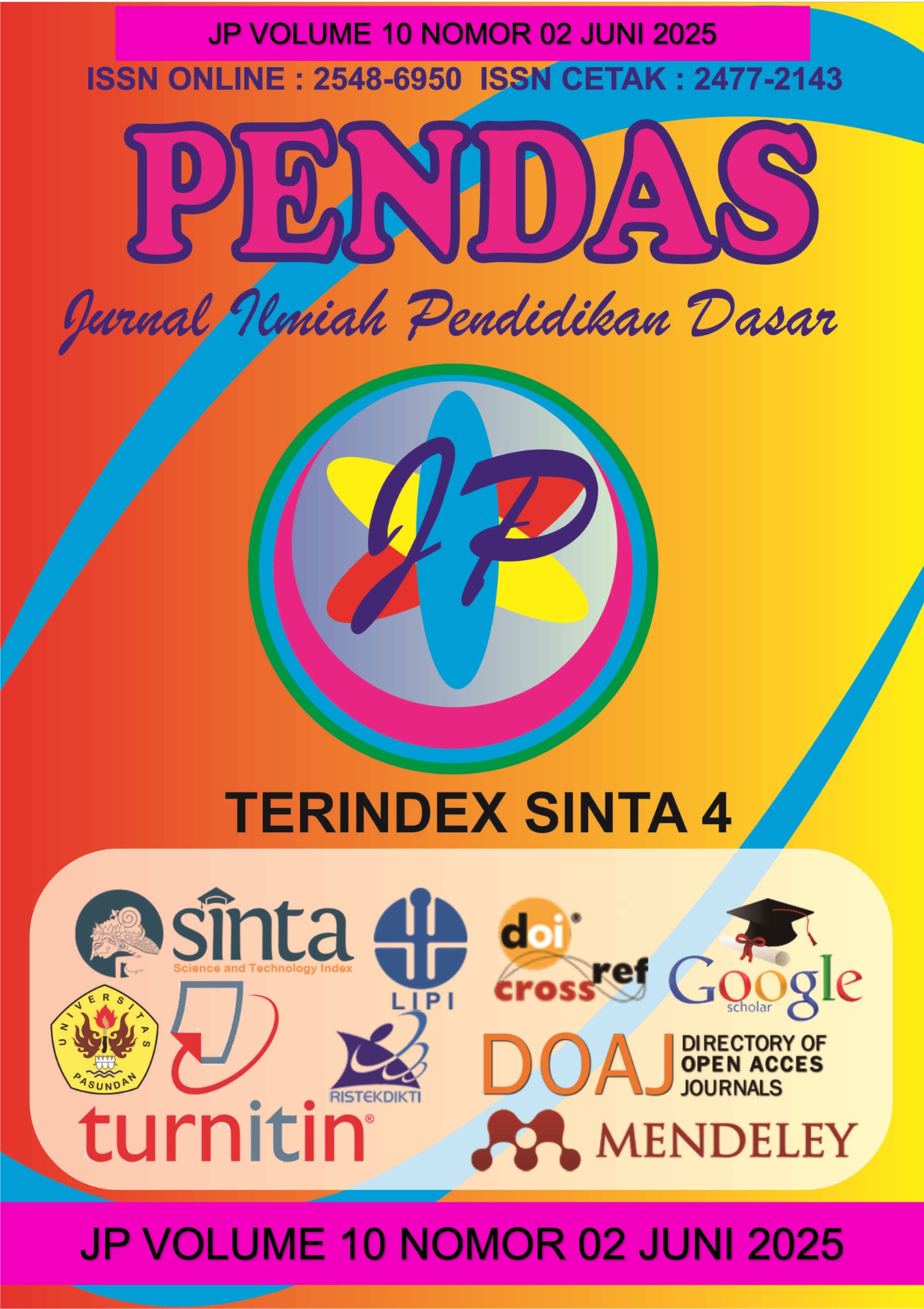PROFIL LITERASI LINGKUNGAN SISWA DALAM MENDUKUNG SDGS DI SEKOLAH DASAR
DOI:
https://doi.org/10.23969/jp.v10i02.24763Keywords:
environmental literacy, elementary school, SDGsAbstract
This study aims to describe elementary school students' environmental literacy level in supporting the achievement of Sustainable Development Goals (SDGs). The subjects of the study included students of SDN Rejeni, SDN Sedati Gede II, and SDN Kedungpandan I. The instrument used was an environmental literacy questionnaire covering four domains: ecological knowledge, attitudes towards the environment, cognitive skills, and pro-environmental behavior. The results showed that aspects of students' knowledge and attitudes were in the high category, while cognitive skills and pro-environmental behavior were still classified as moderate. To overcome these weaknesses, learning media are needed that not only convey information but also train critical thinking and encourage real action. LKPD based on Project-Based Learning (PjBL) is considered appropriate because it can integrate aspects of knowledge, attitudes, skills, and behaviour thematically and contextually. Through the implementation of LKPD based on PjBLl, students are expected to be more active, reflective, and care about the environment sustainably.
Downloads
References
Febriani, V. (2022). Hubungan pengetahuan lingkungan terhadap sikap peduli lingkungan siswa SD Muhammadiyah 6 Pekanbaru. Jurnal Kiprah Pendidikan, 1(2),43, https://doi.org/10.33578/kpd.v1i2.33
Yulianti, V., & Kusumaningrum, D. (2021). Analisis keterampilan literasi lingkungan siswa SD di Kecamatan Turen tahun pelajaran 2019/2020. Primary Education Journal or Primary School Journal, 1(1), 10–20. https://doi.org/10.33379/primed.v1i1.694
Al-Hilmiyah, N. A., & Suhartini, S. (2024). Analisis kemampuan literasi lingkungan siswa sekolah Adiwiyata Mandiri. Jurnal Edukasi Biologi, 10(1). https://doi.org/10.21831/edubio.v10i1.20358
Kartini, D., & Aljamaliah, S. N. M. (2023). Implementasi literasi sains untuk menumbuhkan karakter peduli lingkungan menggunakan model PjBL di SD. Jurnal Pendidikan Tambusai, 7(2),6312–6319. https://doi.org/10.31004/jptam.v7i2.7221
Yuniar, Y. (2022). Literasi lingkungan siswa SD melalui pembelajaran RADEC pada topik air: Studi kasus siswa kelas V SDN 141 Lokajaya Kecamatan Arcamanik Kota Bandung [Tesis Magister, Universitas Pendidikan Indonesia]. UPI Repository. https://repository.upi.edu/80740/
Indrawan, I. P. O., Lepiyanto, A., Juniari, N. W. M., Intaran, I. N., & Sri, A. A. I. R. (2022). Penumbuhan literasi lingkungan di sekolah dasar. Jurnal Ilmiah Pendidikan Profesi Guru, 5(1), 21–31. https://doi.org/10.23887/jippg.v5i1.47385
Tilbury, D. (2011). Education for Sustainable Development: An Expert Review of Processes and Learning. Paris: UNESCO.
UNESCO. (2017). Education for Sustainable Development Goals: Learning Objectives. Paris: UNESCO.
Miles, M. B., & Huberman, A. M. (1994). Qualitative data analysis: An expanded sourcebook (2nd ed.). Thousand Oaks, CA: Sage Publications.
National Environmental Literacy Assessment (NELA). (2008). Developing a baseline of environmental literacy in the United States: Final report. Washington, DC: National Oceanic and Atmospheric Administration & North American Association for Environmental Education.
Santrock, J. W. (2012). Psikologi pendidikan (Edisi ke-5, Alih bahasa A. Tri Wibowo). Jakarta: Kencana Prenada Media Group.
Sugiyono. (2017). Metode penelitian kuantitatif, kualitatif, dan R&D. Bandung: Alfabeta.
Pujianti, N. (2018). Analisis kemampuan literasi lingkungan siswa SMP dalam pembelajaran pencemaran lingkungan dengan menggunakan problem based learning di daerah pertanian dan pesisir Subang [Tesis Magister, Universitas Pendidikan Indonesia]. UPIRepository. https://repository.upi.edu/40165/
Downloads
Published
Issue
Section
License
Copyright (c) 2025 Pendas : Jurnal Ilmiah Pendidikan Dasar

This work is licensed under a Creative Commons Attribution 4.0 International License.














































